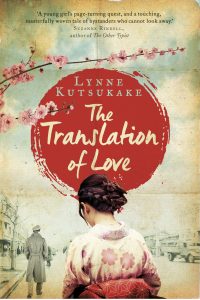Starting Afresh: a National & Personal Quest for Identity & Healing
Christina Courtenay
 The Translation of Love (Transworld / Doubleday, 2016) by Lynne Kutsukake is a moving story which highlights a difficult time in Japan’s history: the aftermath of World War II, when the country spent six years under American occupation. This period has not been extensively covered, and when asked why, Kutsukake replied that she wasn’t sure. “Obviously, I think the immediate post-war period is a fascinating time,” she said.
The Translation of Love (Transworld / Doubleday, 2016) by Lynne Kutsukake is a moving story which highlights a difficult time in Japan’s history: the aftermath of World War II, when the country spent six years under American occupation. This period has not been extensively covered, and when asked why, Kutsukake replied that she wasn’t sure. “Obviously, I think the immediate post-war period is a fascinating time,” she said.
The Americans began to transform Japan into a western-style nation through parliamentary democracy and reforms such as women’s suffrage. They sent aid, and this opportunity for change must have been welcomed by many. But life after the war was harsh, with large numbers of people on the brink of starvation. The fact that Japan had been defeated – despite its citizens being assured such a thing wasn’t possible – had severely shocked the entire nation. Kutsukake’s novel offers insight into the minds of those who lived through this time, showing the difficulty of starting over when everything has been lost and change is forced.
We follow a young girl, Fumi, as she searches for her sister, but we also see her friend Aya’s struggle with repatriation. As Japanese Canadians, Aya and her father are interned and given an ultimatum – move east of the Rockies or go back to Japan. They choose the latter, but Aya doesn’t feel Japanese.
Citizens were invited to write letters to General MacArthur, who was overseeing the Occupation – “If you have a problem, write a letter. This is what democracy means” – and they did, 500,000 of them! Aya helps her classmate by writing to MacArthur in English, on Fumi’s behalf, asking for help. The letter reaches a Japanese-American translator, Matt, who becomes involved in Fumi’s search. His family was also interned during the war, and Matt puts his translation skills to good use while grappling with the question of where he belongs. Kondo Sensei, the girls’ teacher, is also struggling to find his way in this new era.
Members of the author’s family were sent to internment camps in the interior of British Columbia during the war, and I asked her if they ever spoke about their experiences, whether any of them went back to Japan. She said, “They spoke about being sent to ghost town camps in the mountains and being given only 24 hours to pack one suitcase … But they didn’t go into great detail. I learned a lot about the internment from books. My maternal grandparents repatriated to Japan, but my grandfather died two years later. Eventually my grandmother was brought back to Canada.”
Japanese culture does not encourage speaking about or showing emotion, so I wondered if Lynne had noticed this within her family. “Indeed, there was much reticence among the older generation,” she told me.
The word that kept running through my mind as I read was “bewilderment” – the Japanese were confused by new democratic concepts, while the Americans were equally bewildered by Japanese culture. It is clear that neither side really understood the other.
I lived in Japan in the mid-1970s and was aware of some residual resentment towards Americans. This story led me to understand it and empathise. When Japan lost the war, this dealt a huge blow to the Japanese people’s sense of honour a concept paramount in their culture. This book illustrates that the thousands of GIs who descended on the country had no understanding of this, no idea of what they were doing to a proud nation, even if their intentions were good.
The Japanese – especially women – were incredibly resilient, and what emerged, despite the devastation of war, is an amazing country. This book showcases the strength of character and determination that helped Japan rebuild itself.
About the contributor: Christina Courtenay’s (aka Pia Fenton) novels, Highland Storms (2012) and The Gilded Fan (2014), won Romantic Novelists’ Association Awards for Best Historical Romantic Novel of the Year. Her latest work, The Jade Lioness (Choc Lit, 2015), is a historical adventure set in 17th-century Japan. http://christinacourtenay.com
______________________________________________
Published in Historical Novels Review | Issue 77, August 2016






